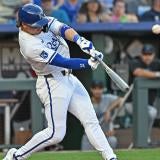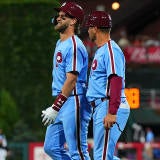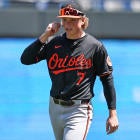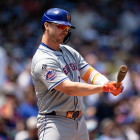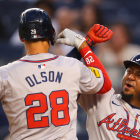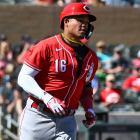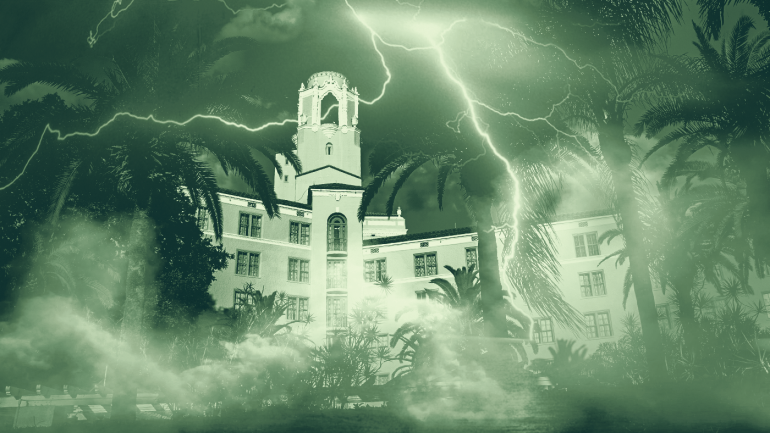
Barry Davis is haunted. Not by a ghost, but a hotel: The Vinoy Renaissance St. Petersburg Resort & Golf Club, the preferred establishment for teams in town on business with the Tampa Bay Rays.
Formerly an on-field reporter for Sportsnet's Toronto Blue Jays broadcasts, Davis has encountered the Vinoy plenty of times in real life. Over the last couple years, he's revisited the hotel more than five times in the same dream. At the beginning, he finds himself entering the Vinoy and requesting a room in the big tower, the newer part of the hotel. The staff never grants his wish, instead sentencing him to the older, more storied side of the building.
"I'm walking on this endless hall, looking for this room, and after going around all these twists and turns in this darkness, I finally get [there]," Davis told CBS Sports. "I open the door, and it's basically a humongous empty room, just a bed and a little table beside it. Every time I would lay down, I would hear a splashing noise -- like a pool. I'd open up the window and there'd be nothing there. I always go back to the front desk and say, 'I need to get another room, you put me in the wrong room' and they say 'sorry, this is the only one we have.'
"I've had so many nights in that hotel that it gives me the creeps."
Davis isn't the first member of baseball's family squicked out by the Vinoy. He's one of the lucky ones, walking away with no greater payment than a dream -- albeit an odd, recurring one. Others have suffered more, disembarking from sunny St. Petersburg, Florida with a first-hand appreciation for the Vinoy's standing as perhaps the most haunted hotel in baseball.
Superstition is baseball's life force. It's why hitters adjust their gloves between swings; why pitchers abstain from pregame scrums on start days; why both groups scribble messages in batter's boxes and on mounds; why fans bemoan media members who mention an in-progress no-hit bid; and why undeterred media members flood baseball's lore with curses … of the Bambino, the Billy Goat, the Rocky Colavito trade -- or was that the Bobby Bragan firing?
Anecdotal evidence suggests working in or around baseball requires or helps develop a hunger for superstition. It also, seemingly, enhances one's chances of a supernatural encounter. Hence the haunted hotel stories scattered across the game like broken-bat shards. Ghost tales are so prevalent in clubhouses that authors Mickey Bradley and Dan Gordon intended to write one book on the topic and wound up penning two, Haunted Baseball and Field of Screams.
"We went into it not knowing how many stories there would be," Bradley said. "We ended up with nine chapters that didn't fit in the first book."
In the eight years since the second book, enough stories have materialized to fill a third and perhaps a fourth. (Bradley said there were no plans to write another.) Social media's advent has enabled players to share these stories in intimate and real-time fashion. Earlier this year, Cardinals right-hander Carlos Martinez jumped on Instagram to share that he and teammate Marcell Ozuna had spotted ghosts in their hotel rooms. Other all-star talents have reported weird occurrences over the years, including Bryce Harper, Adrian Beltre, Michael Young, Giancarlo Stanton, and Pablo Sandoval, who later paid for a room in a different hotel.
Specters don't discriminate between the best and worst players the way a fleshy autograph seeker might. The best-known ghost story in recent time concerns the otherwise inconspicuous Ji-Man Choi, a first baseman who now plays for the Rays. Choi expressed comfort with the ghost's presence, owing it to multiple past experiences. He even joked he was okay sharing a bed with it -- provided it was a girl.
Disobedient lights and faucets, opening and slamming doors, moving shadows, inexplicable changes in temperature, noises with uncertain origins -- these phenomena are standard fare in haunted hotel stories. To hear a thread of the yarn is to hear the whole ball. On occasion, though, a tale pops up with enough carry on it to exceed the boggle threshold.
Bradley's favorite story involves former reliever Jon Switzer's first night in the majors. Switzer and his wife were in bed in their Vinoy room when they heard scratching. An investigation turned up nothing, and the two returned to bed. But when the noise returned, the pair resumed their search. That's when they discovered the painting behind the bed had come to life. Therein, the woman was attempting to claw her out to freedom. Welcome to the Show, meat.
With stories like Switzer's spreading around, it's no wonder The Atlantic Paranormal Society (or TAPS), the crew behind the dormant SyFy television series "Ghost Hunters," traveled to St. Petersburg with cameras in tow to check out things for themselves.
"There were so many reports from the past baseball players and patrons who stayed there that had all these different experiences," said Jason Hawes, founder of TAPS and brother of Josh, who was drafted twice as a pitcher in the '90s. "Whether it be feeling like they're being held down in beds, all different things like that, to patrons leaving in the middle of the night just to get away because the experiences they had [left them] too frightened to stay there."
The Vinoy's reputation may have landed it on the small screen, but it isn't the only marquee haunted hotel on the circuit. The Pfister Hotel in Milwaukee, Wisconsin -- where Martinez and Ozuna shared their sleepless night -- is just as dreaded by visiting players. Even those who don't necessarily believe in such things concede there's something off about the place.
An 11-year big-league veteran, Matt Walbeck remembered scoffing at his teammates' warnings as they pulled into the parking lot. "I'm thinking, 'yeah, sure, whatever.' You get there and all of the sudden you definitely feel like you're in parts of the movie 'The Shining,'" he said. "I got really sick there one night, just had these horrible chills and fever and was hearing crazy sounds and all that kind of stuff. From that point forward I felt a little bit eked out by that hotel."
Ghosts exist outside of time and space, so they don't concern themselves with the more trivial lines of demarcation, either, like the difference between a major- and minor-league player. Sure, prospects don't receive comparable pay or treatment, and most aren't under the union's umbrella, but the ghouls at the Radisson Lackawanna Station Hotel in Scranton, Pennsylvania and Partridge Inn in Augusta, Georgia are as welcoming toward them as they would be if Mike Trout walked through the door and requested lodging.
Star or scrub, big-leaguer or organizational filler, it doesn't seem to make any difference to the things that go bump in the night. It's worth asking: just what is going on here? Does baseball, as silly as it sounds to the right-brain thinker, have itself a ghost problem?
Baseball's history is strewn with individuals who were captured by the paranormal. Former Detroit Tigers owner John Fetzer believed in spiritualism. Longtime minor-league infielder Hernan Iribarren dabbled in witchcraft. Current Colorado Rockies starter Jon Gray took to hunting ghosts after enduring one as a child. Los Angeles Angels coach Steve Soliz has been said to have a photograph of a ghost. And so on.
Why are ballplayers more superstitious, more prone to supernatural occurrences, and more likely to accept the unexplainable as an answer than the average bipedal?
"Ballplayers get used to the idea that logic does not explain what they experience all the time," Bradley said. "When something odd or weird happens, they're more used to looking outside of logic for an explanation." Players lust so to find the cause for their effect that some have identified Bradley as the reason for a loss, suggesting his pregame questions about jinxes and curses triggered their defeat. "So then I would just go into the winning locker room," he joked.
In Ghostland, Colin Dickey wrote that "ghost stories reveal the contours of our anxieties, the nature of our collective fears and desires, the things we aren't talk about in any other way." Perhaps this is especially true of ballplayers, who live different, exceptional lives when compared to an everyday person. They might not want to trade their pine tar for ectoplasm, but superstitions and ghost stories help provide a sense of order to their often wild lives that they would lack without.
"If you're at your house everyday, you wake up at whatever time you wake up, you make avocado toast, you pour your coffee, you sit there and read your newspaper, you have your routine," said Michael Clair, a MLB.com writer and paranormal aficionado. "When you're on the road for 90 days, you turn to superstitions to give you that structure."
Wearing the same socks, or adjusting a cup between pitches seems like an obsessive tic. But the player is trying to clear their mind and reset their body ahead of the next act. At minimum, there's an element of organization -- and yes, a semblance of control over their movements and decisions and, most importantly, their results. Blaming a flickering light or a cold breeze on a ghost is easier than digging in and stressing out -- particularly when you have enough on your back to begin with.
"[Baseball players] don't want to mess up anything that could throw them off kilter. They have a sense of trepidation on anything like that, especially even in their lockers, how things are set up," said Walbeck. "They're very routine-orientated. If there's anything they feel in the back of their mind could be out of their control, it sort of makes them think and wonder ... which, in baseball, you don't want to think too much.
"It's enough to make guys not want to test it -- like the Jobu doll in 'Major League'"
Everyone knows one can't hit and think at the same time. Avoiding thought is nonetheless a challenge. For as hectic as baseball's schedule is -- three, four days in a place then off to another over and over for six months -- there's an untidy amount of idle time. Forget burning sage in the hotel -- players have to do it in their minds during those quiet hours when negative self-talk can emerge. Embracing their rotes and their beliefs, no matter how esoteric they seem to outsiders, helps shift the burden of failure elsewhere while giving them a greater sense of control over their fate.
Put another way, a player pulling on his sleeve between pitches is a deliberate, meditative act. It helps the player relinquish concern and worry, and accept that they've done everything they can in order to succeed. Framed in such a manner, who can mock or object? By all means, pull away -- pull twice on Sundays … or don't, wouldn't want to throw things off.
Ballplayers, then, are superstitious and concerned about ghosts and other things that go bump in the night because they're human. Humans aren't programmed to be perfect robots of reason at all times. Sometimes, the logical requires the illogical.
So, say, what about the ghosts?
Not everyone accepts that ghosts exist. Yet open-minded folk will find Hawes' explanations to be refreshing and reasonable.
"I can't sit there and say that beyond a shadow of the doubt we found evidence to support that the place is haunted," Hawes said about the Vinoy. "But through the amount of claims that people have of the location, there has to be some truth behind it. But now also comes the whole thing of mass hysteria. People are hearing that this place is haunted and they're going and staying there so no matter what happens they're going to chalk that up to a ghost."
Hawes thinks more than 80 percent of claims of ghostly activity can be disproven. (That percentage might be higher among ballplayers: Bradley's second book included a chapter on ghost-related pranks.) Still, he warns that players could be at greater risk for ghost-related mishap because they're a large group who are frequently charged up with emotions from the night's game. The player's mood can work against their minds, leading them to believe every little noise or breeze is a ghost's doing, and/or can work toward energizing the spirits, allowing them to manifest or commit their brand of hijinks and tomfoolery.
It's not a coincidence that the buildings in question are older: The Vinoy was built in 1925, the Pfister in 1893. A hotel borne from a past era of architecture and technology can unintentionally spook modern folk with its old-time elevators and floor-rigged radiators. A lengthy history will inevitably include unfortunate events -- murders, natural disasters -- and those tragedies can provide compelling backstory for a player wanting to connect the flickering lights to a person long past. Heck, even when a player does experience the work of a incorporeal being, it's not necessarily a conscious affront. Some hauntings are not "intelligent," according to Hawes -- rather, they're loops of residual energy contained within the structure, repeating without malicious intent.
Using that definition, Davis is indeed haunted by the Vinoy every time he experiences his recurring dream. He doesn't seem to mind too much, however: "It's a beautiful hotel. They've got an amazing pool there."





